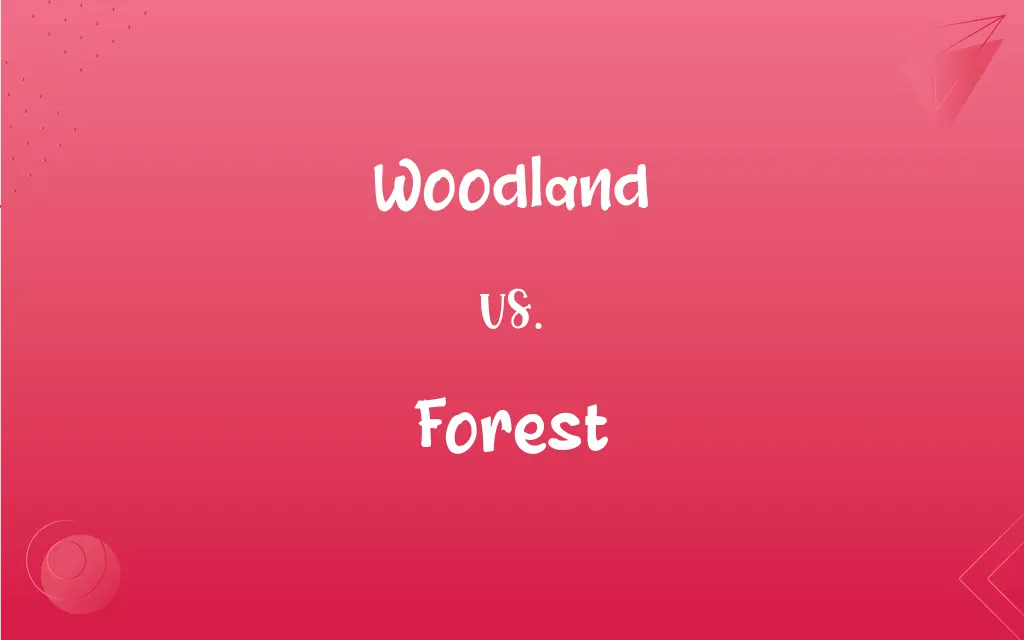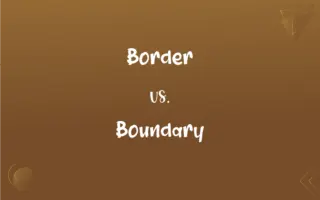Woodland vs. Forest: What's the Difference?
Edited by Aimie Carlson || By Harlon Moss || Updated on November 6, 2023
Woodland refers to a smaller area with sparse trees, while a forest is a large area densely packed with trees.

Key Differences
Woodland areas are characterized by being less dense, often with more space between trees, allowing sunlight to penetrate to the ground. In contrast, a forest typically denotes a larger, denser area of land heavily populated with trees, often forming a closed canopy.
In a woodland, the flora and fauna can differ significantly from that of a forest due to variations in light and space available. Forest ecosystems are usually more complex, with a greater variety of species supported by the dense tree cover and distinct ecological processes.
The term woodland is often used to describe smaller tracts of land that may be part of rural or semi-rural landscapes, whereas forests are generally vast areas that can span thousands of square miles, supporting vast biodiversity.
Management practices for woodlands can be more focused on conservation and recreation, considering their often more accessible sizes. Forests may be managed for a variety of uses, including timber production, conservation, and recreation, requiring different, often more extensive, management approaches.
Woodland may sometimes refer to areas that have been regenerated after deforestation or areas with young or smaller trees. Conversely, forests are typically thought of as areas with mature, often ancient, tree communities and more developed ecosystems.
ADVERTISEMENT
Comparison Chart
Size
Typically smaller
Usually larger
Density of Trees
Sparse, more open space
Dense, closely packed trees
Canopy Cover
Open canopy allowing more sunlight
Closed canopy, less sunlight penetration
Biodiversity
Usually less diverse than forests
Typically more diverse ecosystems
Usage
Often for recreation and conservation
Can include timber production, conservation, recreation
ADVERTISEMENT
Woodland and Forest Definitions
Woodland
A small forested area or region.
The woodland was alive with the sounds of birds.
Forest
A large area covered predominantly with trees.
The ancient forest was home to towering redwoods.
Woodland
An area for conservation and recreation.
The new trail leads hikers through a beautiful stretch of woodland.
Forest
A dense collection of trees and underbrush.
The forest's dense canopy provided shelter for numerous species.
Woodland
Land covered with trees and shrubs.
They picnicked in the sunny glades of the woodland.
Forest
An ecosystem with high biodiversity.
The rainforest is one of the richest forests in terms of biodiversity.
Woodland
A habitat with lower tree density.
Deer were seen grazing in the woodland.
Forest
Land managed for timber and wildlife.
The national forest is carefully managed to balance both conservation and industry needs.
Woodland
A term often associated with rural landscapes.
The artist's retreat was nestled in a tranquil woodland.
Forest
A reference to larger, more mature tree communities.
They ventured deep into the forest where the trees grew thick and old.
Woodland
Of or relating to a Native American culture prevalent throughout much of eastern North America beginning around 1000 BC and lasting especially in northeastern regions until contact with Europeans, characterized by increasing reliance on settled agriculture, by the development of Neolithic crafts and tools, and in certain areas by the building of ceremonial mounds.
Forest
A growth of trees and other plants covering a large area.
Woodland
Of, relating to, or constituting woodland.
Forest
A large number of objects bearing a similarity to such a growth, especially a dense collection of tall objects
A forest of skyscrapers.
Woodland
Living, growing, or present in woodland
Woodland flowers.
FAQs
Are woodlands always smaller than forests?
Generally, yes, woodlands are smaller and less dense than forests.
Can a forest be part of a woodland?
No, a forest is typically larger and would encompass woodlands, not vice versa.
Do woodlands have more wildlife than forests?
Not necessarily; it depends on the specific woodland and forest in question.
Is it easier to walk through a woodland than a forest?
Often yes, because woodlands tend to be less dense.
Can forests be found within urban areas?
Rarely, as forests are large and dense, they are usually outside urban areas.
What kind of recreation is common in woodlands?
Hiking, bird watching, and picnicking are common.
Are woodlands good for biodiversity?
Yes, woodlands can support a wide range of species, though usually less than forests.
Do forests have more tree species than woodlands?
Typically, yes, forests support a greater diversity of tree species.
Can woodlands be home to endangered species?
Yes, many woodlands provide critical habitats for endangered species.
Do all forests have closed canopies?
Most mature forests do, but there can be exceptions.
Are woodlands man-made?
They can be either natural or man-made.
Can forests exist in arid climates?
Yes, there are types of forests adapted to arid conditions.
Can a woodland evolve into a forest?
Over time, with proper conditions, woodlands can become denser, resembling forests.
How are woodlands affected by climate change?
Climate change can alter their composition and health, just like forests.
Are all forests protected?
No, not all forests are protected; it varies by region and country.
Are national parks classified as forests?
Some national parks can be classified as forests, but not all.
What are the main threats to woodlands?
Development, pollution, and invasive species are common threats.
Is it easier to see the sky from a woodland?
Yes, because the tree canopy is usually not as dense.
Are forests more susceptible to wildfires than woodlands?
Dense forests can be, but the risk varies widely based on the forest type and management.
Do people live in forests?
Some forests are home to indigenous communities and others.
About Author
Written by
Harlon MossHarlon is a seasoned quality moderator and accomplished content writer for Difference Wiki. An alumnus of the prestigious University of California, he earned his degree in Computer Science. Leveraging his academic background, Harlon brings a meticulous and informed perspective to his work, ensuring content accuracy and excellence.
Edited by
Aimie CarlsonAimie Carlson, holding a master's degree in English literature, is a fervent English language enthusiast. She lends her writing talents to Difference Wiki, a prominent website that specializes in comparisons, offering readers insightful analyses that both captivate and inform.































































